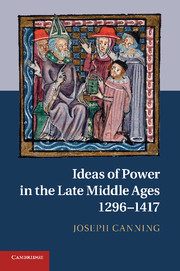Book contents
- Frontmatter
- Contents
- Preface
- Abbreviations
- Introduction
- Chapter 1 Ideas of power and authority during the disputes between Philip IV and Boniface VIII
- Chapter 2 Dante Alighieri: the approach of political philosophy
- Chapter 3 Marsilius of Padua
- Chapter 4 Power and powerlessness in the poverty debates
- Chapter 5 The treatment of power in juristic thought
- Chapter 6 The power crisis during the Great Schism (1378–1417)
- Conclusion
- Bibliography
- Index
Introduction
Published online by Cambridge University Press: 25 October 2011
- Frontmatter
- Contents
- Preface
- Abbreviations
- Introduction
- Chapter 1 Ideas of power and authority during the disputes between Philip IV and Boniface VIII
- Chapter 2 Dante Alighieri: the approach of political philosophy
- Chapter 3 Marsilius of Padua
- Chapter 4 Power and powerlessness in the poverty debates
- Chapter 5 The treatment of power in juristic thought
- Chapter 6 The power crisis during the Great Schism (1378–1417)
- Conclusion
- Bibliography
- Index
Summary
The argument of this book is that radically new ways of discussing questions of power were developed in the period from the end of the thirteenth century to the early fifteenth century – the long fourteenth century of the European Late Middle Ages. This study is particularly concerned with the most fundamental problem of political thought – where does legitimate authority lie? In short, who is in charge? These years saw a remarkably intensive increase in the production of what may be called political thought texts, both in terms of quantity and quality. The works of these authors were characterized by an engagement with political reality and especially with a series of spectacular political and religious crises: they were not theorists writing in relative isolation from the world. The sophistication and depth of their discourses rested on the development of academic disciplines in thirteenth-century universities, but during the course of the fourteenth century, these writers took the elaboration of political ideas to a far higher level than had existed before in medieval political thought. The stimulus for their thinking came from reflection on the demands of reality in a manner and to a degree that was new for the Middle Ages; the rigour and originality of their ideas derived from the education they had received and the creative use they made of it. Historians' treatments of ideas of power in these years have so far tended to be piecemeal. A study like this, focused on ideas of power and authority in this period, has not been attempted before.
In the last thirty or so years, a great deal of research has been done on aspects of the political thought of the long fourteenth century. But largely because of the sheer variety of the sources, approaches have tended to be fragmented, following different lines of enquiry. A new overall interpretation has been lacking. Certain grand themes stand out in the work of modern scholars. Great advances have, for instance, been made in examining the origins of republicanism. Our knowledge of constitutionalism in both the secular, political arena and the church has been much advanced. A flood of light has been shed on the implications of the different languages or forms of discourse used to elaborate political ideas. Our understanding of questions of poverty and property has been deepened. Our appreciation of the nuances of natural law theory has also been greatly increased. I have learned so much from the work of other scholars, but their approaches and leading concerns have been different from my own. By concentrating on the fundamental questions of power and authority, I have sought to produce a distinctive and integrative interpretation which applies to all the various forms of political organization in the fourteenth century.
- Type
- Chapter
- Information
- Ideas of Power in the Late Middle Ages, 1296–1417 , pp. 1 - 10Publisher: Cambridge University PressPrint publication year: 2011



